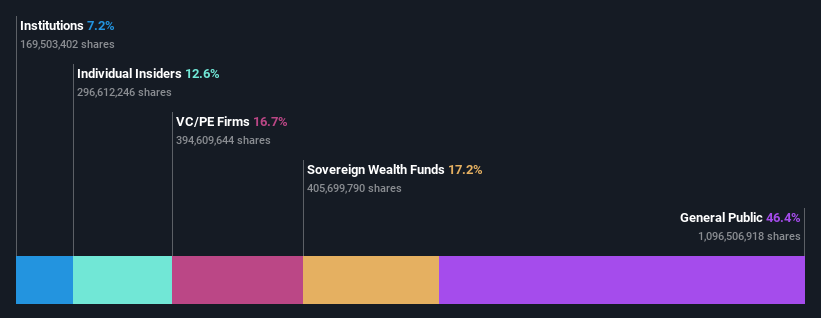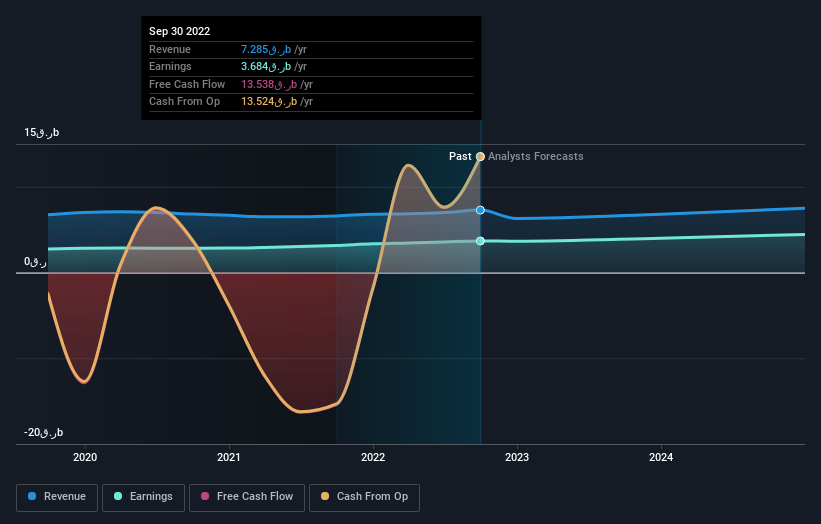Qatar Islamic Bank (Q.P.S.C.)'s (DSM:QIBK) biggest owners are individual investors who got richer after stock soared 3.8% last week

To get a sense of who is truly in control of Qatar Islamic Bank (Q.P.S.C.) (DSM:QIBK), it is important to understand the ownership structure of the business. We can see that individual investors own the lion's share in the company with 46% ownership. That is, the group stands to benefit the most if the stock rises (or lose the most if there is a downturn).
Clearly, individual investors benefitted the most after the company's market cap rose by ر.ق2.1b last week.
Let's delve deeper into each type of owner of Qatar Islamic Bank (Q.P.S.C.), beginning with the chart below.
Our analysis indicates that QIBK is potentially overvalued!

What Does The Institutional Ownership Tell Us About Qatar Islamic Bank (Q.P.S.C.)?
Many institutions measure their performance against an index that approximates the local market. So they usually pay more attention to companies that are included in major indices.
Qatar Islamic Bank (Q.P.S.C.) already has institutions on the share registry. Indeed, they own a respectable stake in the company. This can indicate that the company has a certain degree of credibility in the investment community. However, it is best to be wary of relying on the supposed validation that comes with institutional investors. They too, get it wrong sometimes. When multiple institutions own a stock, there's always a risk that they are in a 'crowded trade'. When such a trade goes wrong, multiple parties may compete to sell stock fast. This risk is higher in a company without a history of growth. You can see Qatar Islamic Bank (Q.P.S.C.)'s historic earnings and revenue below, but keep in mind there's always more to the story.

Hedge funds don't have many shares in Qatar Islamic Bank (Q.P.S.C.). Our data shows that Qatar Investment Authority is the largest shareholder with 17% of shares outstanding. Qatar Holding LLC is the second largest shareholder owning 17% of common stock, and Hamad Bin Jassim Bin Jabr Bin Al Thani holds about 6.5% of the company stock.
We did some more digging and found that 7 of the top shareholders account for roughly 51% of the register, implying that along with larger shareholders, there are a few smaller shareholders, thereby balancing out each others interests somewhat.
Researching institutional ownership is a good way to gauge and filter a stock's expected performance. The same can be achieved by studying analyst sentiments. There are plenty of analysts covering the stock, so it might be worth seeing what they are forecasting, too.
Insider Ownership Of Qatar Islamic Bank (Q.P.S.C.)
While the precise definition of an insider can be subjective, almost everyone considers board members to be insiders. The company management answer to the board and the latter should represent the interests of shareholders. Notably, sometimes top-level managers are on the board themselves.
Insider ownership is positive when it signals leadership are thinking like the true owners of the company. However, high insider ownership can also give immense power to a small group within the company. This can be negative in some circumstances.
Our most recent data indicates that insiders own a reasonable proportion of Qatar Islamic Bank (Q.P.S.C.). It is very interesting to see that insiders have a meaningful ر.ق7.2b stake in this ر.ق57b business. It is good to see this level of investment. You can check here to see if those insiders have been buying recently.
General Public Ownership
The general public, who are usually individual investors, hold a 46% stake in Qatar Islamic Bank (Q.P.S.C.). This size of ownership, while considerable, may not be enough to change company policy if the decision is not in sync with other large shareholders.
Private Equity Ownership
Private equity firms hold a 17% stake in Qatar Islamic Bank (Q.P.S.C.). This suggests they can be influential in key policy decisions. Sometimes we see private equity stick around for the long term, but generally speaking they have a shorter investment horizon and -- as the name suggests -- don't invest in public companies much. After some time they may look to sell and redeploy capital elsewhere.
Next Steps:
It's always worth thinking about the different groups who own shares in a company. But to understand Qatar Islamic Bank (Q.P.S.C.) better, we need to consider many other factors.
I like to dive deeper into how a company has performed in the past. You can find historic revenue and earnings in this detailed graph.
But ultimately it is the future, not the past, that will determine how well the owners of this business will do. Therefore we think it advisable to take a look at this free report showing whether analysts are predicting a brighter future.
NB: Figures in this article are calculated using data from the last twelve months, which refer to the 12-month period ending on the last date of the month the financial statement is dated. This may not be consistent with full year annual report figures.
Valuation is complex, but we're here to simplify it.
Discover if Qatar Islamic Bank (Q.P.S.C.) might be undervalued or overvalued with our detailed analysis, featuring fair value estimates, potential risks, dividends, insider trades, and its financial condition.
Access Free AnalysisHave feedback on this article? Concerned about the content? Get in touch with us directly. Alternatively, email editorial-team (at) simplywallst.com.
This article by Simply Wall St is general in nature. We provide commentary based on historical data and analyst forecasts only using an unbiased methodology and our articles are not intended to be financial advice. It does not constitute a recommendation to buy or sell any stock, and does not take account of your objectives, or your financial situation. We aim to bring you long-term focused analysis driven by fundamental data. Note that our analysis may not factor in the latest price-sensitive company announcements or qualitative material. Simply Wall St has no position in any stocks mentioned.
About DSM:QIBK
Qatar Islamic Bank (Q.P.S.C.)
Provides corporate, retail, and investment banking products and services in Qatar and internationally.
Adequate balance sheet average dividend payer.
Market Insights
Community Narratives




